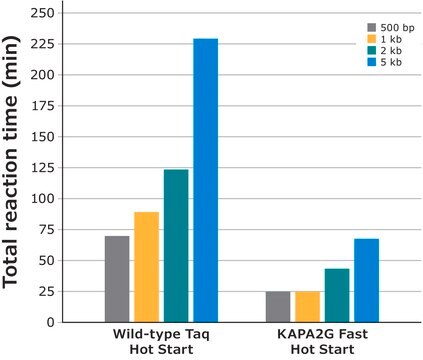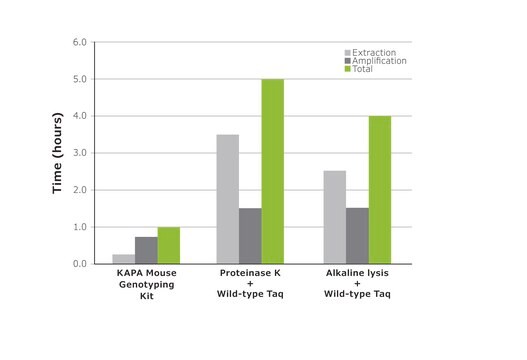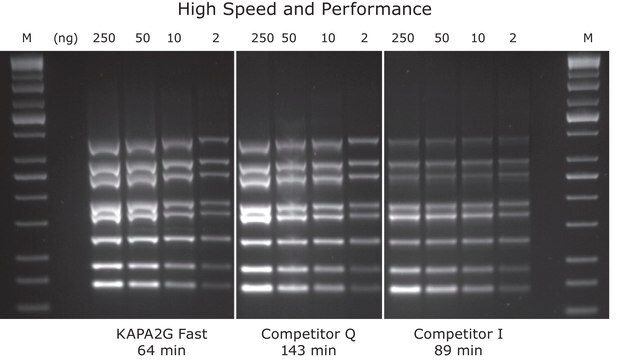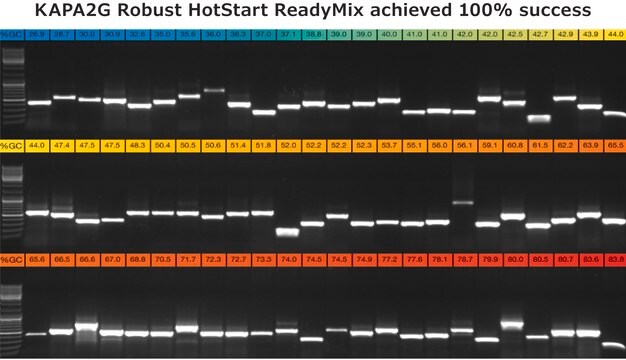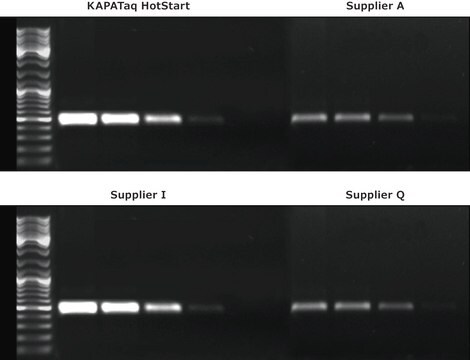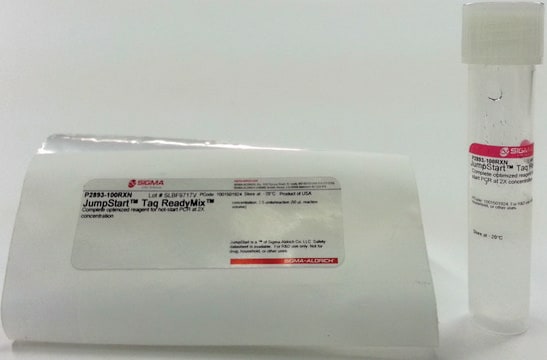2GFHSGKB
Roche
KAPA2G Fast HotStart Genotyping Mix
with dye
Synonym(s):
PCR, genotyping
About This Item
Recommended Products
Quality Level
usage
sufficient for 100 reactions
sufficient for 500 reactions
shelf life
≤18 mo.
feature
Difficult Templates/Specialty Enzymes PCR
dNTPs included
hotstart
packaging
kit of 1.25 mL (100 x 25 μL rxn; KK5620)
kit of 6.25 mL (500 x 25 μL rxn; KK5621)
manufacturer/tradename
Roche
technique(s)
PCR: suitable
genotyping: suitable
input
crude DNA
storage temp.
−20°C
General description
Application
- Genomic DNA extraction and in the preparation of master mix for PCR
- Extraction and amplification from mouse tail, ear, and toe tissue
- Extraction and amplification of DNA from other animal tissues
Biochem/physiol Actions
Features and Benefits
- PCR-ready DNA generated in as little as 15 minutes
- Minimal handling, thereby reducing the risk of sample loss or contamination
- Sufficient template for multiple assays; easily scaled to handle samples in a 96-well format
- Fast and reliable amplification of DNA fragments across a wide range of amplicon lengths and GC contents
Outperforms crude extraction methods and commercial kits:
- Increased turnaround times
- Increased specificity
- Decreased cost
Quick Notes:
- Extract PCR-ready DNA from mouse tail, ear, or toe tissue in 15 minutes
- Dilute DNA extract 10-fold prior to PCR in 10 mM Tris-HCl (pH 8.0-8.5), and use 1 μL of DNA per 25 μL reaction.
- Extracts are stable at -20°C for >6 months.
- KAPA2G Fast (HotStart) Genotyping Mix contains the engineered KAPA2G Fast DNA Polymerase for fast PCR, along with buffer, MgCl2 (1.5 mM at 1X), and dNTPs (0.2 mM each at 1X).
- Loading dye for electrophoresis is included in the KAPA2G Fast Genotyping Mix, which allows direct loading of PCR products onto agarose gels for analysis.
- Use 15 sec annealing time, with 15 sec extension time for amplicons <1 kb, or 15-30 sec/kb extension for longer amplicons.
Packaging
- 2X KAPA2G Fast Standard or HotStart Genotyping Mix with dye
Quality
Preparation Note
Other Notes
Legal Information
Signal Word
Warning
Hazard Statements
Precautionary Statements
Hazard Classifications
STOT SE 2
Storage Class Code
12 - Non Combustible Liquids
WGK
WGK 1
Flash Point(F)
does not flash
Flash Point(C)
does not flash
Certificates of Analysis (COA)
Search for Certificates of Analysis (COA) by entering the products Lot/Batch Number. Lot and Batch Numbers can be found on a product’s label following the words ‘Lot’ or ‘Batch’.
Already Own This Product?
Find documentation for the products that you have recently purchased in the Document Library.
Customers Also Viewed
Articles
An overview of directed evolution and the methods for generating proteins with optimized or entirely new functions.
Our team of scientists has experience in all areas of research including Life Science, Material Science, Chemical Synthesis, Chromatography, Analytical and many others.
Contact Technical Service